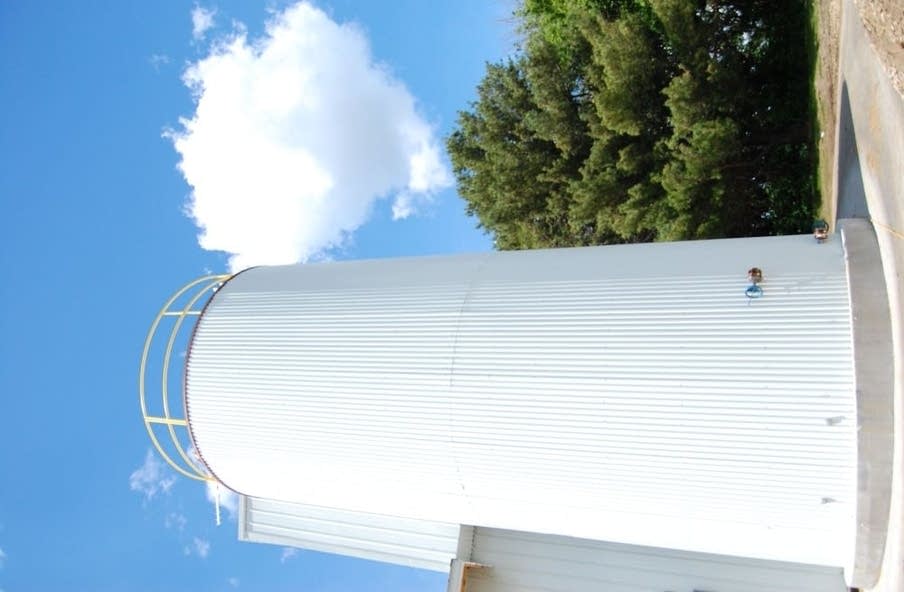Farmer uses methane to make electricity
Go Deeper.
Create an account or log in to save stories.
Like this?
Thanks for liking this story! We have added it to a list of your favorite stories.

The 200 cows on Jerry Jennisson's central Minnesota dairy farm make 1,100 gallons of milk every day, and they make even more manure, as much as 3,000 gallons daily.
In the past Jennisson stored the manure in lagoons and used it as fertilizer. But now he's also using it to make electricity.
It's a fairly simple process. The manure is piped from the barn to a 40 foot silo. It's heated to 100 degrees. That's when bacteria naturally present in the manure gets to work and makes methane.

"The gas bubbles to the top," Jennison said pointing to a system of pipes. "And then flows through that pipe and down over there and is plumbed directly into the engine."
Turn Up Your Support
MPR News helps you turn down the noise and build shared understanding. Turn up your support for this public resource and keep trusted journalism accessible to all.
The methane powers a specially rebuilt Chevy 350 engine. The engine turns a 37 kilowatt generator. Half the electricity created actually goes back into the process of making methane. A local power company will pay Jennisson to put the other half on the grid.
"We will either get a check, or they will credit my account," Jennison said.
Jennisson's methane powered generator hasn't been running long enough for him to get a check yet, but he thinks he'll get about $400 a month for the energy he puts on the grid.
Jennison can still use the manure for fertilizer after it's run through the process. Because it no longer contains methane, it's lost much of its odor, and doesn't emit as many greenhouse gases.

On top of that, Jennisson feels good that his farm is making an alternative source of energy.
"I think it's another piece of the puzzle," Jennison said. "I think it'll take a lot of different things to solve our energy problems, and I think this can be part of it."
Some say using manure from Minnesota's dairy farms could be an even bigger part of the country's energy future. The biggest hurdle is cost. This on-farm power plant, called a manure digester, is only the third in the state, and it has a half a million dollar price tag. Federal, state and local grants paid for much of it, but the farmer paid the remaining $100,000.
Amanda Bilek is with the Minnesota Project, a rural economic development group. Bilek said manure is an untapped energy resource in Minnesota. But it has to make money to get more farmers to convert it to electricity.
"If we could just figure out the equation to make the benefits line up to give a decent rate of return to producers ... there's a big potential out there for the future of the electric industry, as well as the livestock industry in Minnesota," Bilek said.
There are tax breaks and incentives in place for manure digesters in Minnesota, but Bilek said more federal and state incentives would encourage more farmers to build them.

Renewable energy supporters would like to repeat the success of the first manure digester in Minnesota. It started producing power about eight years ago on Dennis Haubenshild's dairy farm near Princeton.
"We supply enough electricity on this dairy to supply the dairy plus about another 70 homes," Haubenschild said.
Haubenshild figures his nearly 1,000 dairy cows make the energy equivalent of about nine barrels of oil a day.
He's excited to see another manure digester up and running in Minnesota. And he hopes someday the systems are spread all across the state.
"Maybe not every dairy would operate the digester on their own," Haubenschild said. "But I could see co-ops or something putting in digesters and supplying renewable energy for our communities. It's part of being sustainable."
There's another advantage for farmers who make methane powered energy on their farms according to Haubenschild.
Because the methane from his cow's manure is being turned into electricity instead of sent into the atmosphere, he can trade carbon credits on the Chicago Climate Exchange. Right now that's a way for Haubenshild to make another $360 a week.
Dear reader,
Political debates with family or friends can get heated. But what if there was a way to handle them better?
You can learn how to have civil political conversations with our new e-book!
Download our free e-book, Talking Sense: Have Hard Political Conversations, Better, and learn how to talk without the tension.




